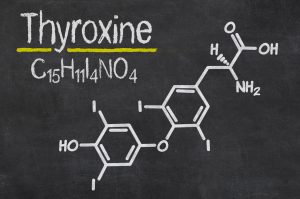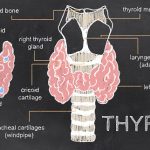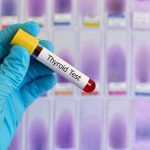 Hypothyroidism, also referred to as underactive thyroid, has been linked to PCOS, or polycystic ovary syndrome. While many studies show that these two conditions share some of the same symptoms, most experts still say that they are separate health issues.
Hypothyroidism, also referred to as underactive thyroid, has been linked to PCOS, or polycystic ovary syndrome. While many studies show that these two conditions share some of the same symptoms, most experts still say that they are separate health issues.
Hypothyroidism is a condition in which the thyroid gland does not produce enough of certain hormones. Having hypothyroidism disrupts the balance of chemical reactions in the body and while it usually doesn’t cause symptoms in the beginning, if untreated, it can lead to a number of health problems, including join pain, obesity, heart disease, and infertility.
Advertisement
In PCOS, the levels of a woman’s sex hormones are out of balance. This can lead to ovarian cysts, as well as problems with menstrual cycle, cardiac function, and fertility.
PCOS is a fairly common condition that some women, especially those with hypothyroidism, are diagnosed with.
Today, there is a great deal of research conducted on hypothyroidism and PCOS, including PCOS and hypothyroidism together.
Link between hypothyroidism and PCOS
The link between hypothyroidism and PCOS is hard to define, but recent research has been able to shed some light on the relationship between the conditions. Researchers looked at patients with untreated hypothyroidism who had polycystic ovary syndrome and comparing them to people with normal ovaries, putting both groups through a battery of hormonal tests. Results from the tests were compared with ovarian volumes.
Thyroid hormones have numerous effects on a woman’s reproductive system. Changes in thyroid function, such as hypothyroidism, can lead to ovulation dysfunction and infertility. Hypothyroidism and PCOS normally include increased serum free testosterone, luteinizing hormone (LH), and high cholesterol. When ovaries of women with hypothyroidism and PCOS were viewed with an ultrasound, an increase in ovarian volume, as well as cystic ovaries were often visible. When thyroid hormone replacement therapy was administered and thyroid hormone levels stabilized, the ovarian cysts seemed to get smaller and ovarian volume decreased.
The thyroid and PCOS link has been pointed out by both studies and patient reports. Hypothyroid women often suffer from menstrual problems and fertility issues. Recent studies have shown that women with hypothyroidism, with or without polycystic ovaries, had significantly larger ovaries, thus suggesting that thyroid dysfunction has a large impact on ovarian size and just might produce ovarian cysts.
Hypothyroidism vs. PCOS: U.S. prevalence
 Hypothyroidism and PCOS link continues to be investigated. What we do know for certain is that thyroid hormone regulates metabolism, which is the way our body uses energy. This hormone affects many organs in our body. Without enough of thyroid hormone, many bodily functions just slow down.
Hypothyroidism and PCOS link continues to be investigated. What we do know for certain is that thyroid hormone regulates metabolism, which is the way our body uses energy. This hormone affects many organs in our body. Without enough of thyroid hormone, many bodily functions just slow down.
Hypothyroidism is more common in women, but it does happen to men, too. An estimated 4.6 percent of Americans aged 12 or older have hypothyroidism. You are at higher risk for hypothyroidism if you have a family history of autoimmune disease, suffer from primary pulmonary hypertension, have genetic syndromes like Turner’s or Down, a history of neck and head irradiation, or if you are over 65 years old.
Statistics show that between one in 10 and one in 20 women of childbearing age have PCOS. Some experts suggest that as many as 5 million women in the United States may be affected by polycystic ovary syndrome, which can occur in girls as young as eleven years old.
Differentiating PCOS and hypothyroidism sign and symptoms
PCOS and hypothyroidism share some of the same symptoms, such as fatigue, weight gain, and mood changes. But if you take a careful look at the typical signs and symptoms of each condition, you will see there is some difference between hypothyroidism and PCOS.
With hypothyroidism, symptoms vary depending of the severity of the hormone deficiency, but here are some common symptoms:
- Increased sensitivity to cold
- Constipation
- Dry skin
- Weight gain
- Fatigue
- Puffy face
- Hoarseness
- Muscle weakness
- High cholesterol
- Muscle ache and stiffness
- Heavier menstrual periods
- Slowed heart rate
- Impaired memory
- Depression
PCOS symptoms can develop shortly after puberty for some people and often go unnoticed in the beginning. Below is a list of typical signs and symptoms of PCOS:
- Weight gain
- Fatigue
- Unwanted hair growth
- Thinning hair on head
- Infertility
- Acne
- Pelvic pain
- Headaches
- Mood swings
- Difficulty sleeping
As you can see, PCOS and hypothyroidism symptoms do overlap, but they each have some distinct signs that set them apart.
Comparing hypothyroidism and PCOS causes
 The question – is hypothyroidism and PCOS related? – is not cut and dry. Evidence seems to suggest that there is a link, but that not all women get both conditions at the same time. Medical researchers are still hard at work when it comes to pinpointing the causes of both hypothyroidism and PCOS, which can ultimately help us gain a better understanding of just how closely related they are.
The question – is hypothyroidism and PCOS related? – is not cut and dry. Evidence seems to suggest that there is a link, but that not all women get both conditions at the same time. Medical researchers are still hard at work when it comes to pinpointing the causes of both hypothyroidism and PCOS, which can ultimately help us gain a better understanding of just how closely related they are.
Here is what we know so far about the cause of hypothyroidism. Experts say that it may be due to a number of different factors, including autoimmune diseases. Autoimmune diseases take place when your immune system produces antibodies that attack your own tissues. Sometimes, this can involve the thyroid gland. Other factors could be thyroid treatment (which can impact hormone production), radiation therapy that affects the thyroid gland, and other medications that can activate hypothyroidism. Whenever you are prescribed a new medication, it is important to discuss the possible side effects with your doctor.
The root cause of PCOS is also a mystery. However, some researchers speculate that excess insulin might impact ovaries by increasing androgen production, which can interfere with a woman’s ability to ovulate. Low-grade inflammation is another theory. Some studies have demonstrated that women with PCOS have low-grade inflammation and that it stimulates polycystic ovaries to produce androgens. Lastly, researchers are looking into the possibility that certain genes are associated with PCOS.
Hypothyroidism vs. PCOS: Risk factors and complications
If you have an autoimmune disease, a family history of thyroid disease, have been treated with radioactive iodine or anti-thyroid mediations, or have had thyroid surgery, you’re at an increased risk of developing hypothyroidism.
If you have hypothyroidism, it is important to be treated. If left untreated, the condition can lead to a number of complications, including those listed below:
- Goiter – swelling of the neck
- Heart problems – risk of heart disease, enlarged heart, and heart failure
- Mental health issues – depression and/or slow mental functioning
- Peripheral neuropathy – damage to nerves carrying information from brain to spinal cord.
- Myxedema – intense cold intolerance, followed by drowsiness and unconsciousness. Can be fatal.
- Infertility – hypothyroidism can interfere with ovulation
- Birth defects – babies more prone to intellectual and developmental problems.
The symptoms of PCOS are hard enough to deal with, without adding complications to the mix. PCOS complications could include any of the following:
- Diabetes – elevated insulin levels or insulin resistance
- Heart and blood vessel problems
- Uterine cancer
- Sleep apnea
- Pregnancy problems – miscarriage, gestational diabetes, and possibly C-section birth.
Difference between hypothyroidism and PCOS diagnosis and treatment
 PCOS and hypothyroidism treatment vary, as does the diagnostics for each condition. For instance, a diagnosis of hypothyroidism is based on symptoms and blood tests that measure the levels of TSH (thyroid-stimulating hormone) and thyroid hormone thyroxine. A low level of thyroxine and high level of TSH indicate underactive thyroid.
PCOS and hypothyroidism treatment vary, as does the diagnostics for each condition. For instance, a diagnosis of hypothyroidism is based on symptoms and blood tests that measure the levels of TSH (thyroid-stimulating hormone) and thyroid hormone thyroxine. A low level of thyroxine and high level of TSH indicate underactive thyroid.
In the past, it was hard to detect hypothyroidism until symptoms were advanced. However, with the sensitive TSH test, it is much easier to diagnose thyroid disorders earlier. TSH tests are important in managing hypothyroidism because they help doctors decide what the right medication dosage is for an individual.
Treatment of hypothyroidism often involves the use of synthetic thyroid hormone. The oral medication is said to restore hormone levels, helping to reverse the symptoms associated with the condition. Many patients notice an improvement within one or two weeks of taking the medication. Dosage will have to be adjusted throughout a patient’s lifetime, so TSH level will be tested on a regular basis. For many people that means at least once a year. Even diet can play a major role during the treatment process of hypothyroidism. Some foods can deteriorate the hypothyroidism condition even more, so managing with hypothyroidism suitable diet can be helpful.
Advertisement
When it comes to PCOS or polycystic ovary syndrome, the diagnosis involves a review of your medical history, symptoms, blood tests, and possibly a vaginal ultrasound to allow doctors to view the patient’s reproductive organs. Thyroid function tests will often be conducted, along with fasting glucose tests and lipid level tests to assess cholesterol.
Treatment for PCOS focuses on managing the symptoms and helping the patient avoid any complications. A healthy diet and exercise is highly recommended, especially if excess weight is an issue. Losing weight can help regulate menstrual cycle and lower blood glucose level. Fertility drugs, anti-androgen drugs, and surgery are other treatment options. The anti-androgen drugs can help stop excess hair and reduce acne.
Most medical experts now believe that PCOS hypothyroidism is real, and that there needs to be more discussion and research around the relationship between the two conditions. At the same time, it seems that these are two separate ailments with their own individual features and, therefore, have to be considered independently as well when a person complains about symptoms.
